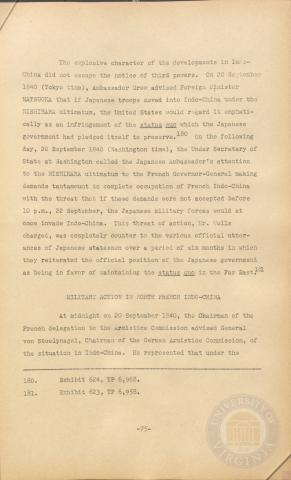
Page 75
| Parent | Japanese - German - Italian Collaboration |
|---|---|
| Date | |
| Language | English |
| Collection | Tavenner Papers & IMTFE Official Records |
| Box | Box 14 |
| Folder | Japan, Germany, Italy Collaboration and Introduction |
| Repository | University of Virginia Law Library |
The explosive character of the developments in Indo- China did not escape the notice of third powers. On 20 September 1940 (Tokyo time), Ambassador Grew advised Foreign Minister HATSUOKA that if Japanese troops moved into Indo-China under the NISHIHARA ultimatum, the United States would regard it emphati¬cally as an infringement of the status QUO which the Japanese government had pledged itself to preserve. 180 On the following day, 20 September 1940 (Washington time), the Under Secretary of State at Washington called the Japanese Ambassador's attention to the NISHIKARA ultimatum to the French Governor-General making demands tantamount to complete occupation of French Indo-China with the threat that if these demands were not accepted before 10 p.m., 22 September, the Japanese military forces would at once invade Indo-China. This threat of action, llr. Wells charged, was completely counter to the various official utter¬ances of Japanese statesmen over a period of six months in which they reiterated the official position of the Japanese government as being in favor of maintaining the status quo- in the Far East. 181
MILITARY ACTION IN NORTH FRENCH INDO-CHINA
At midnight on 20 September 1940, the Chairman of the French delegation to the Armistice Commission advised General von Stuelpnagel, Chairman of the German Armistice Commission, of the situation in Indo-China. He represented that under the
180Exhibit 624, TP 6,968.
181Exhibit 623, TP 6,958.
